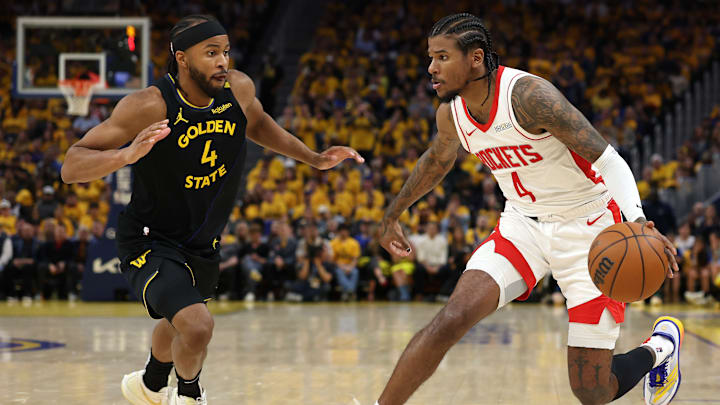Houston Rockets fans are heartbroken.
Their team had a tremendous 2024-25 season, but it's over. Defeat came at the hands of the Golden State Warriors.
That's the most painful part. The Rockets surpassed expectations by securing the second seed in the Western Conference. A first-round defeat to a more experienced team was always an acceptable outcome.
Why did it have to be the Warriors?
Had James Harden and his Clippers vanquished the Rockets, sleep would not have been so elusive last night. Instead, we're left processing our collective trauma. Rockets fans today could be cast in One Flew Over The Cuckoo's Nest.
"Curry for 3...no...No, Green can't hit one too...Curry again...Nooooooo".
Yes. The Warriors eliminated the Rockets again. It's over. Now, it's time to think about the offseason.
One decision should be painfully obvious.
Rockets need to move on from Jalen Green
The Rockets got largely positive contributions from their young core.
Alperen Sengun's efficiency left much to be desired. He also shouldered a disproportionate amount of responsibility. Sengun tried to put the team on his back. He failed, but his willingness to try should be commended.
Amen Thompson was a mixed bag. He struggled to generate offense in the halfcourt for the first few games. Once he realized that the paint was his domain and nobody could take it from him, he found his rhythm. The Rockets should be encouraged by the sophomore's first postseason appearance.
Jabari Smith Jr. was a low-volume, high-efficiency darling. Creating for himself was not in the cards, but he established himself as a valuable piece.
Tari Eason giveth, and Tari Eason taketh away. He made some head-scratching plays throughout this series, but he also asserted his will often enough to inspire hope.
Then, there's Jalen Green. He was bad.
That's all that can be said about him.
Rockets get nothing from Green in the postseason
Green scored 13.3 points per game in the Rockets' series with the Warriors. That includes a 38-point outburst in Game 2.
Isn't that so Jalen Green? One transcendent performance lost in a forest of sorrow. Green is an abusive partner. Just when you've concluded that it's time to leave, he ropes you back in with a thoughtful gift.
It's time for the Rockets to put his stuff in a box, leave it on the front door, and change the locks.
Some fans will feel differently. They'll suggest that Green is a downhill guard on a team with the NBA's worst spacing. They will have a point. Sengun and Thompson feel like the two players who don't complement Green in the starting lineup.
Here's a thought experiment. A team loses in the first round. Throughout the series, Player A averages 20.9 points, 11.9 rebounds, and 5.3 assists per game with a Box Plus/Minus (BPM) of 4.7 and a True Shooting % (TS%) of 49.1%. Player B averages 13.3 points, 5.4 rebounds, and 2.9 assists with a BPM of -1.5 and a 48.2 TS%.
You are the Houston Rockets' General Manager (congratulations!). The owner has informed you that he doesn't believe in Player A and Player B as a pairing, and given you a mandate to trade one this summer.
How could the choice be more obvious?
Are Green and Sengun a poor fit together? Certainly. Why invest in the one that hasn't produced? Green is a theory. It is possible that he would be more productive in a different system.
Sengun is an unequivocal fact. He is already productive. Sure, his efficiency needs to improve, but every advanced metric suggests that he impacts winning even when the shot isn't falling. The same metrics suggest almost universally that the Rockets are better when Green is on the bench.
Building an NBA team doesn't require a lofty education. You identify what's working and curate it, and cull whatever isn't. Surrounding Sengun and Thompson with shooters should result in a strong team. Forming a Big 3 with that duo and a star player with substantial three-point gravity should work, too. Clinging to Green's potential despite a mountain of empirical evidence that he's not reaching it should not:
He'll only break the Rockets' hearts again.
